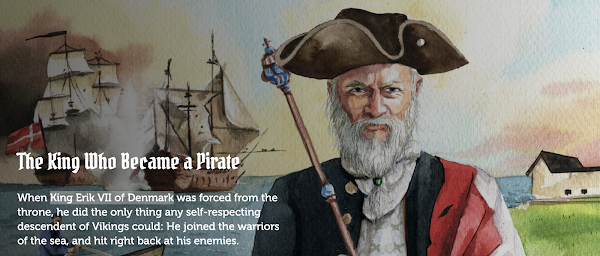Erik VII of Denmark, Hamlet, and Piracy
Many people who study Hamlet—if they dig into the history and sources at all—may only learn of the 12th century Amleth tale recorded in the 13th century by Saxo Grammaticus, and its later incarnation in Belleforest. They may also note the fact that James VI and I of Scotland and England married Anne of Denmark in 1589. For many readers of the play, that is sufficient historical background.
An April 2020 story posted at Narratively by Anja Klemp Vilgaard tells of a Danish King Erik VII who turned to piracy to take back his throne, which sounds a bit like Hamlet returning from his sea voyage with the help of pirates.
https://narratively.com/the-king-who-became-a-pirate/
Eric VII of Denmark (c.1381–1459) was also Eric III of Norway, and Eric XIII of Sweden, with a rule in all three countries that overlapped, and was known as Eric of Pomerania, as noted in various sources.
Erik VII never got his thrones back. He had married Philippa of England, daughter of Henry IV ("Bollingbroke" - who appears in three Shakespeare plays: Richard II, Henry IV part 1, and Henry IV part 2), but they never had any children.
Students of Elizabethan history might also note that Elizabeth made use of English privateers (pirates) like Sir Francis Drake and Sir Walter Raleigh to raid Spanish (and other) ships, making pirates popular in some ways (at least to the English, whose coffers were enriched). One may also note that during the reign of James, some English pirates in the Mediteranian, some of whom had converted to Islam, sought to be pardoned and repatriated.
Is it good that, in discussion of sources, editions of the play mention Saxo Grammaticus and Belleforest, but ignore other possible historical figures such as Eric of Pomerania who have thematic connections to the play? Or is this an example of how Shakespeare scholarship can become an echo chamber resistant to new insights?
An April 2020 story posted at Narratively by Anja Klemp Vilgaard tells of a Danish King Erik VII who turned to piracy to take back his throne, which sounds a bit like Hamlet returning from his sea voyage with the help of pirates.
https://narratively.com/the-king-who-became-a-pirate/
Eric VII of Denmark (c.1381–1459) was also Eric III of Norway, and Eric XIII of Sweden, with a rule in all three countries that overlapped, and was known as Eric of Pomerania, as noted in various sources.
Erik VII never got his thrones back. He had married Philippa of England, daughter of Henry IV ("Bollingbroke" - who appears in three Shakespeare plays: Richard II, Henry IV part 1, and Henry IV part 2), but they never had any children.
Students of Elizabethan history might also note that Elizabeth made use of English privateers (pirates) like Sir Francis Drake and Sir Walter Raleigh to raid Spanish (and other) ships, making pirates popular in some ways (at least to the English, whose coffers were enriched). One may also note that during the reign of James, some English pirates in the Mediteranian, some of whom had converted to Islam, sought to be pardoned and repatriated.
Is it good that, in discussion of sources, editions of the play mention Saxo Grammaticus and Belleforest, but ignore other possible historical figures such as Eric of Pomerania who have thematic connections to the play? Or is this an example of how Shakespeare scholarship can become an echo chamber resistant to new insights?

Comments
Post a Comment